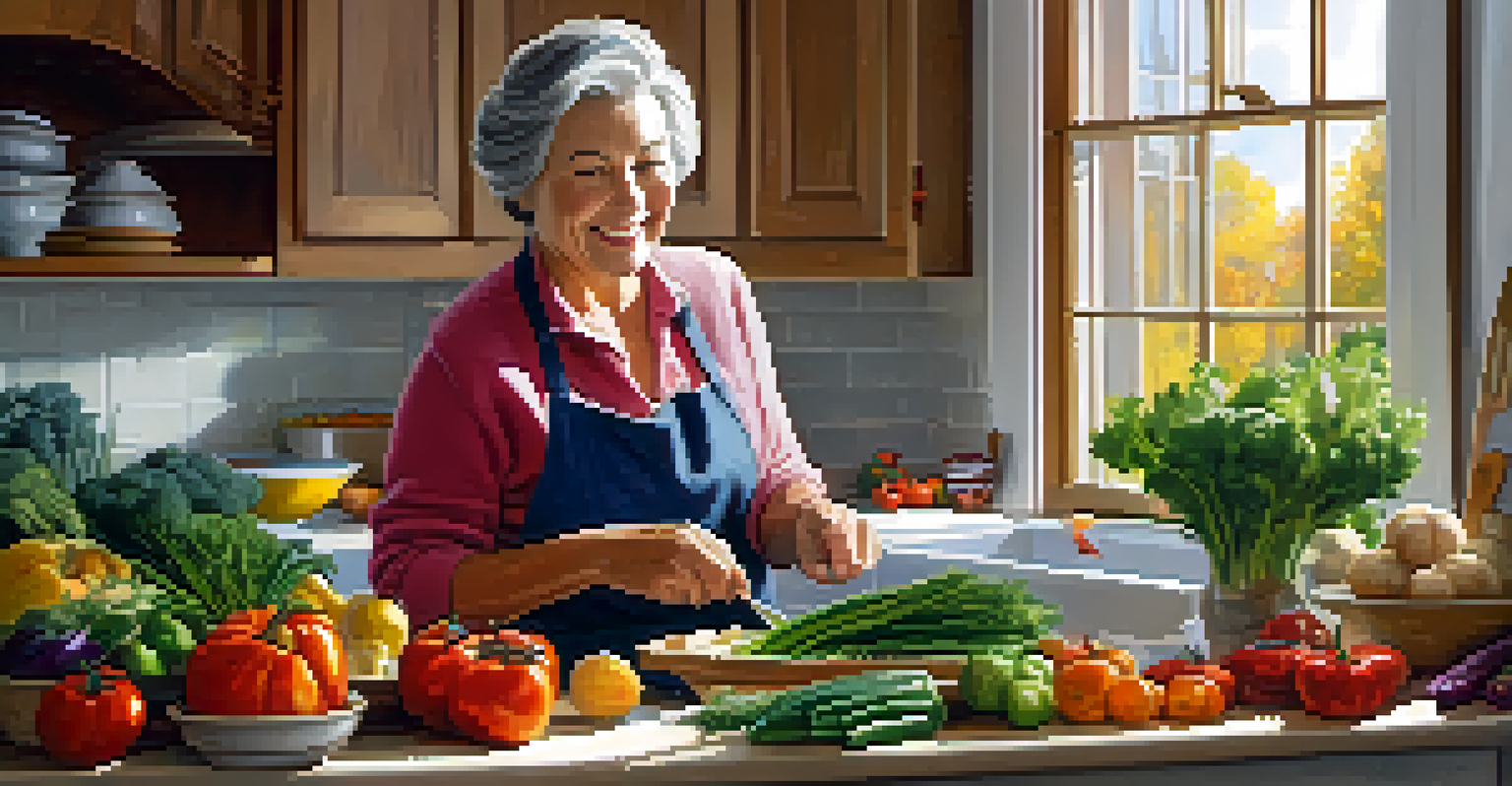Healthy Aging: Key Health Considerations for Older Women

Understanding the Importance of Healthy Aging
Healthy aging is not just about longevity; it encompasses maintaining physical and mental well-being as we grow older. For older women, this means recognizing the unique health challenges they may face due to hormonal changes, lifestyle factors, and social roles. Embracing a proactive approach can significantly enhance quality of life, fostering independence and vitality.
Aging is not lost youth but a new stage of opportunity and strength.
Moreover, taking the time to prioritize health can lead to a more fulfilling life. It's about making informed choices that support both physical health and emotional resilience. This can include everything from nutrition to social connections, all of which play a critical role in overall well-being.
In essence, healthy aging is about empowerment. By understanding what factors contribute to our health as we age, older women can create strategies that promote a vibrant and active lifestyle, ensuring they not only live longer but thrive throughout their later years.
Nutrition: Fueling Your Body for Longevity
Nutrition is a cornerstone of healthy aging, especially for older women who may have different dietary needs. A balanced diet rich in fruits, vegetables, whole grains, and lean proteins can help mitigate age-related health issues. For instance, calcium and vitamin D are essential for bone health, while antioxidants can help combat oxidative stress.

It's also important to adapt your diet to meet changing metabolism and digestive health. Smaller, more frequent meals can help maintain energy levels and ensure nutrient absorption. Hydration is equally crucial, as older adults often experience decreased thirst sensations, increasing the risk of dehydration.
Embrace Healthy Aging Strategies
Older women can enhance their quality of life by proactively addressing physical and mental health needs.
By focusing on a well-rounded diet, older women can not only manage their weight but also enhance their overall health. Simple changes, like incorporating more plant-based meals or reducing processed foods, can lead to significant improvements in how one feels and functions daily.
Physical Activity: Staying Active and Engaged
Regular physical activity is vital for maintaining strength, balance, and flexibility, especially as we age. For older women, engaging in a mix of aerobic exercises, strength training, and flexibility workouts can prevent falls and enhance mobility. Even simple activities like walking, gardening, or dancing can make a difference.
The greatest glory in living lies not in never falling, but in rising every time we fall.
In addition to physical benefits, exercise also boosts mental health by releasing endorphins and reducing feelings of anxiety and depression. Finding activities that you enjoy can create a sustainable routine that keeps you motivated and engaged. Group classes or community activities can also foster social connections, which are crucial for emotional well-being.
Ultimately, staying active is about finding what works for you and making it part of your daily life. Whether it's a brisk walk in the park or a yoga class, every bit of movement counts towards a healthier, more fulfilling life.
Mental Health: Prioritizing Emotional Well-Being
As we age, mental health can sometimes take a backseat to physical health, but it's equally important. Older women may face unique emotional challenges, such as loneliness or grief from losing loved ones. It's essential to recognize these feelings and seek support when needed, whether through friends, family, or professional counseling.
Engaging in activities that stimulate the mind—such as reading, puzzles, or learning a new skill—can also help maintain cognitive function. Social connections play a vital role in mental health, so staying connected with loved ones and participating in community events can provide a sense of belonging and purpose.
Nutrition Fuels Longevity
A balanced diet tailored to changing health needs is essential for older women to maintain vitality.
In short, prioritizing mental health is about creating a balanced lifestyle that nurtures both the mind and body. By being proactive in addressing emotional well-being, older women can enhance their overall quality of life and navigate the aging process with confidence.
Regular Health Screenings: Staying Ahead of Potential Issues
Regular health screenings are a vital component of preventive care for older women. Routine check-ups can help detect potential health issues early, allowing for timely intervention. Conditions such as high blood pressure, diabetes, and certain cancers can often be managed or treated more effectively when caught early.
It's important to discuss with your healthcare provider which screenings are appropriate based on your age, family history, and lifestyle. For example, mammograms and bone density tests are crucial for women over 50, while cholesterol and blood sugar levels should be monitored regularly.
By staying on top of health screenings, older women can take charge of their health and make informed decisions that impact their well-being. Knowledge is power, and being proactive about health can lead to a longer, healthier life.
Social Connections: The Power of Community and Relationships
Social connections are essential for healthy aging, contributing significantly to emotional well-being. For older women, maintaining relationships with family, friends, and community can reduce feelings of isolation and loneliness. Engaging in social activities, whether it's a book club or volunteering, can provide a sense of purpose and joy.
Moreover, strong social ties have been linked to better physical health outcomes, including lower rates of heart disease and improved cognitive function. It's never too late to forge new friendships or strengthen existing ones. Simple gestures, like reaching out to a neighbor or joining a local group, can enrich your social life.
Social Connections Matter
Building and maintaining relationships significantly contributes to emotional well-being and overall health in aging.
Ultimately, nurturing relationships is about finding joy in connections with others. The support and companionship that come from these interactions can make a significant difference in how older women experience aging.
Sleep: The Unsung Hero of Health and Wellness
Quality sleep is often overlooked but plays a critical role in healthy aging. Many older women struggle with sleep disturbances, which can impact both physical and mental health. Sleep is essential for cognitive function, emotional regulation, and overall vitality, making it crucial to prioritize good sleep hygiene.
Establishing a calming bedtime routine can help improve sleep quality. This might include activities like reading, gentle stretching, or practicing mindfulness techniques. Creating a comfortable sleep environment—cool, dark, and quiet—can also promote better rest.

By recognizing the importance of sleep and taking steps to improve it, older women can enhance their overall health. A good night's sleep is not just a luxury; it's a fundamental building block for a vibrant and active life.
Mindfulness and Stress Management: Finding Balance
In today's fast-paced world, stress management is vital for healthy aging. Older women may face unique stressors, from caregiving responsibilities to health concerns. Practicing mindfulness techniques, such as meditation or deep breathing exercises, can help alleviate stress and promote a sense of calm.
Incorporating simple mindfulness practices into daily routines can lead to improved mental clarity and emotional resilience. Even just taking a few moments to focus on your breath or appreciate the present can make a significant difference in overall well-being. Consider exploring activities like yoga or tai chi, which combine physical movement with mindfulness.
Ultimately, learning to manage stress and practicing mindfulness can empower older women to navigate life's challenges with grace. By fostering a sense of balance and inner peace, women can enhance their quality of life, making the journey of aging a more enjoyable experience.